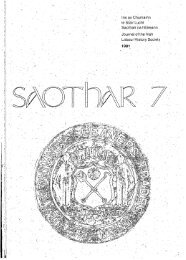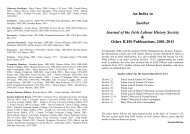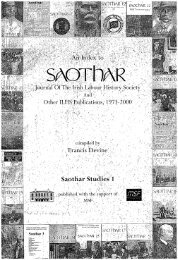Create successful ePaper yourself
Turn your PDF publications into a flip-book with our unique Google optimized e-Paper software.
ESSAYS 871970, it created the conditions for a Fine Gael upsurge in the late 1970s and early 1980s. However, thisdevelopment of Garret FitzGerald ~s 'social-democratic' Fine Gael would be short-lived and largely atthe expense of the Labour Party.24 Or FitzGerald's increasingly neo-liberal prescriptions for theeconomy as Taoiseach would make it easier for FF to reassert its progressiveness in opposition. In officethe party, even while implementing some radical:and intensely unpopular public expenditure cuts, hasensured that it will escape the 'Thatcherism', label, by bringing the leadership of ICTU along in itsProgramme/or National Recovery.25The left, ever hopeful that FF will alienate its working class supporters, should ponder the lessonsof the 1930s. Populism then depended not simply on the quality QHhe economic and social policies itproposed, but on the denunciation of them by the most conservative elementsin political life. Popularappeal depends on the overall context in which policies are proposed. As the Economist noted in itsrecent provocative survey of the Republic, Haughey's recent toughness on public spending does notat all justify a comparison with Thatcher, for he has not broken with what it refers to as 'The vaguelyformulated socialism of his Fianna Fail party'. What the Economist's blue-tinted spectacles define associalism is more correctly specified later as Haughey's tendency to see himself as 'the embodimentof the spirit of Ireland, the true voice of the common man' and his reluctance to take on 'Ireland'scosseted public sector trade unions'. 26 The continuing ability of Fianna Fail to reproduce a populistappeal of this sort, half a century since it was originally developed, would appear to make left hopesof a realignment produced by the pressure of economic crisis as chimerical as ever.NotesHenry Patterson1. M. Peillon, Contemporary Irish Society, (Dublin, 1982), p. 113.2. ibid., p. 114.3. A. Przeworski, Capitalism and Social Democracy, (Cambridge, 1986), p. 47.4. ibid.5. Joseph Lee, 'Irish Nationalism and Socialism: Rumpf Reconsidered', Saothar 6, 1980, p. 59.6. Tom Garvin, The Evolution of Irish Nationalist Politics, (Dublin, 1981); Peter Mair, The Changing Irish PartySystem, (London, 1987).7. E. Rumpf and AC. Hepbum, Nationalism and Socialism in Twentieth Century Ireland, (Liverpool,1977).8. Dick Walsh, The Party, (Dublin, 1986), ch. 10.9. Martin Mansergh (ed.), The Spirit of the Nation: The Speeches and Statements of Charles 1. Haughey, 1957-1986, (Dublin, 1986), p. 198.10. Mair, op.cit., p. 17.1l. Irish Times, 6 February, 1987.12. Sean Cronin, The McGarrity Papers, (fralee, 1972), p. 14l.13. Peter Pyne, 'The Third Sinn Fein Party, 1923-26' in Economic and Social Review 1, 1970.14. 'Socialism and Irish Nationalism' in James Connolly, Socialism and Nationalism, ed. Desmond Ryan,(Dublin, 1948). .15. Brian Reynolds, 'The Formation and Development ofFianna Fail, 1926-1932', DPhil, Trinity College, Dublin,1976, p. 138.16. P.E.I. O'Connor, 'Syndicalism in Ireland, 1917-1923,' PhD, Cambridge, 1984.17. ibid., p.292.18. AnPhoblacht, 3 October, 1931.19. Peadar O'Donnell, Monkeys in the Superstructure, (Galway, 1986), p. 26.20. An Phoblacht, 24 March, 1928.21. See his revealing reflections on Fianna Fail in his pamphlet The Bothy Fire and all that, (Dub'lin, 1937).22. Paul Bew & Henry Patterson, SeanLemass and the Making of Modern Ireland,-(Dublin,.l982),.pp. 173-186.23. Walsh, op.cit., pp. 83-88.24. Mair, op.cit., p.42.25. The Progranune seeks not only to regenerate the economy but to 'improve the social equity of our society ... '





